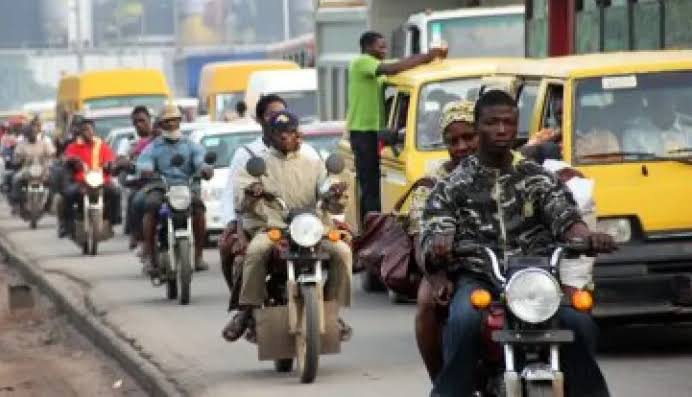Many in the state, including some criminals knew they were in for hard times when Gov. Babajide Sanwo-Olu in May announced the total ban on the activities of commercial motorcycles, popularly known as Okada in six local government areas namely;Ikeja, Surulere, Etiosa, Lagos Island, Mainland and Apapa as first phase starting from June 1.
The governor later announced additional four local government areas which include Kosofe, Oshodi-Isolo, Shomolu and Mushin, bringing them to a total of 10 LGAs.
Investigation revealed that many motorcyclists relocated to other parts of the state where their operation was permitted, some relocated to other States, while some sold their bikes to purchase trycycle or ventured into other businesses.
The governor’s announcement was greeted with mixed reactions by different residents in the state.
While majority worried about the economic effect and inconveniences they would suffer as a result of the ban, some commended the Governor’s order.
According to the Governor, the decision to effect the ban was attributed to disobedience of traffic regulations and increase in crime, particularly traffic robbery using motorcycles.
Sanwo-Olu said the Government took the decision in line with the Lagos State Transport Sector Reform Law of 2018, to immediately address the chaos and menace created by the operations of Okada in the listed areas.
He ordered the police to enforce the order without compromise.
“After a critical review of our restriction on Okada activities in the first six local government areas, where we restricted them on Feb. 1, 2020, we have seen that the menace has not abated. We are now directing a total ban on Okada activities across the highways and bridges within these six local government and their local council development areas, effective from June 1.
“This is a phased ban we are embarking on this period, and we expect that within the short while when this ban will be enforced, Okada riders in other places where their activities are yet to be banned can find something else to do.
“We have given the notice now and we expect all commercial motorcycles plying the routes in the listed councils and areas to vacate the highways before enforcement begins. The enforcement will be total,” he said.
Following reactions that greeted the announcement of the ban, the governor on May 24 , insisted that the state government would go ahead with its proposed ban on motorcycles, stressing that security services and government were on the same page on the ban.
He also assured that the security architecture of the state would not be compromised in any way, so that Lagos residents will continue to live their lives and do their businesses without fear or favour.
“The security meeting gives us an opportunity to review the recent pronouncement on the future ban of Okada (motorcycles) in some selected local governments and LCDAs,”he further said.
It was however observed that many states of the Federation have also tolled the same path with Lagos by placing ban on commercial motorcycles within their metropolis due to security report on crimes being perpetrated with motorcycles.
Not less than six months into the ban of commercial motorcycles in Lagos, some residents were still expecting a reversal of the order by the state government due to what they described as inconveniences caused by okada ban in their areas.
Mrs Charity Chukwu, a business woman, who resides at Ojota, said her movement to the market and other places has been hectic as no commercial vehicle or trycycle runs her street, forcing her to trek long distances before getting vehicle or trycycle.
Mr Edward Banjoko, a retired civil servant, who regularly receives treatment from Gbagada General Hospital, said his journey to the hospital has been ‘hell’ from his house as he used to take motorcycle from his house to the hospital, but now resorted to trekking before boarding commercial vehicles on highway.
Some residents, particularly, motorists, however, believed that the ban was in order as commercial motorcyclists have been major nuisance on the road, responsible for traffic gridlock and accidents.
The inconveniences to some residents, no doubt, will continue, but one thing that may be checked by the ban is the crime rate associated with motorcycle’s operation.
The Commissioner of police in Lagos, CP Abiodun Alabi, who commended the State government for the ban, stressed that motorcycle operators had been found to be involved in traffic robberies and other criminalities in the state.
Alabi pointed out that using motorcycles was the easiest way to carry out crime and suspects escaped with ease.
Prior to the ban, many bank customers coming out from the banking halls were robbed with ease on the road by criminals using motorcycles.
Some traders going to the market early in the morning or coming home late were usually attacked and dispossessed of their money and other valuables by men on motorcycles.
A chemical trader at Ojota, Mr Fidelis Onwunka, said that the story was worse during the Yuletide, stressing that since that ban, they have not experienced such attacks in Ojota area.
“The ban has its advantages and disadvantages. Many people have to trek a long distance now due to no bike, but the robbery attacks usually experienced early in the morning or late at night perpetuated by men on bike is no longer there.
“We use tricycles on major roads around Ojota, we have not heard that anyone was robbed since,”Onwunka said.
Speaking to NAN on the level of crime in the state, spokesperson, SP Benjamin Hundeyin, said that the ban had helped to check many crimes, particularly traffic robbery.
Hundeyin noted that apart from traffic lawlessness by the commercial motorcyclists, traffic robbery using motorcycles for operation was a concern to the command.
He, however, said that the number of complaints of traffic robberies and accidents from motorcycles had reduced since the ban.
“Traffic robbery has reduced drastically in Lagos state. All thanks to the ban on motorcycles in some local government areas and expressway,” he said.


